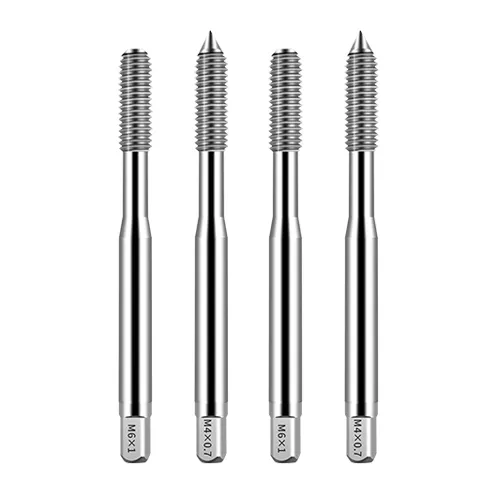What Are Thread Taps and Why Are They Essential for Precision Machining?
2024-11-27
When it comes to precision machining and creating strong, reliable connections between components, the role of thread taps cannot be overstated. But what exactly are thread taps, and why are they so important in manufacturing processes? In this blog, we’ll explore the function, types, applications, and importance of thread taps in machining, offering insights into how they contribute to high-quality, durable products.
What Are Thread Taps?
Thread taps are cutting tools used in machining to create internal threads within holes, allowing components to be fastened using bolts, screws, or other threaded fasteners. Essentially, thread taps are responsible for creating the "female" part of a threaded connection, while other tools like bolts and screws form the "male" part.
The tap works by rotating inside a drilled hole, cutting into the material to form spiral threads. The threads created by the tap are designed to match the threads on the corresponding fastener, ensuring a secure fit. Thread taps come in various sizes, types, and materials to suit different applications and materials being worked on.
How Do Thread Taps Work?
Thread taps operate through a process known as tapping, which involves turning the tap into the material to cut threads. The cutting action is aided by the rotation and pressure applied to the tap, which is typically done by hand or using a machine tool like a lathe or milling machine.
As the tap enters the hole, it removes material to create the threads. Most taps feature spiral flutes, which allow chips (the material being cut away) to be removed from the hole, preventing them from obstructing the threading process.
Types of Thread Taps
There are several different types of thread taps, each designed for specific tasks and applications:
1. Straight Flute Taps: These taps have straight flutes and are commonly used for tapping holes in materials that are soft or ductile. They are best for through holes and work well with lower-carbon steels.
2. Spiral Flute Taps: With flutes that spiral in the direction of rotation, these taps are designed to move chips forward out of the hole, making them ideal for tapping through holes in materials like aluminum and softer metals.
3. Spiral Point Taps: Similar to spiral flute taps, these taps have spiral-shaped points that push chips straight down and out of the hole. They are best suited for through holes and are often used in high-production environments.
4. Gun Taps: Gun taps are designed for deep hole tapping. They are specialized for threading holes that are deep or require a high degree of precision, commonly used in automotive and aerospace industries.
5. Bottoming Taps: These taps are used when you need to tap a blind hole (a hole that does not go all the way through the material). They are able to cut threads all the way to the bottom of the hole, making them ideal for creating strong, deep threads.
6. Boring Taps: These taps are used in conjunction with other boring tools to create high-precision internal threads, often found in machining complex parts like engine blocks.
Why Are Thread Taps Important?
1. Precision and Accuracy
Thread taps are essential for creating threads with high precision. Whether in small components or large machinery, precise threads ensure the fasteners fit perfectly, which is crucial for the strength, safety, and functionality of the final product.
2. Material Compatibility
Different materials, such as metals, plastics, or composites, require specific types of taps to ensure clean, accurate threads. Choosing the right thread tap for a particular material can drastically reduce the likelihood of errors, like stripping threads or damaging the material.
3. Improved Efficiency in Manufacturing
Using the correct thread tap can increase the speed and efficiency of the manufacturing process. Tapping threads is a relatively quick process, and modern tapping machines are capable of high-speed production with minimal setup. The use of specialized taps, such as spiral flute taps, can also reduce downtime by improving chip removal and preventing blockages.
4. Cost-Effective Solution
Thread taps provide a cost-effective method for creating threads compared to other processes like thread rolling or thread milling. Since tapping can be done with minimal equipment, it is a practical choice for both small-scale and high-volume manufacturing.
5. Versatility
Thread taps are highly versatile, and their applications span across various industries. From automotive and aerospace to electronics and medical devices, thread taps are used to create reliable threaded connections for a wide range of components.
Applications of Thread Taps
The versatility of thread taps makes them indispensable in several industries and manufacturing processes. Some common applications include:
- Automotive Manufacturing: Thread taps are used to create threads for bolts and screws that hold parts like engine blocks, transmissions, and suspension components together.
- Aerospace: In the aerospace industry, thread taps are used to create high-precision threads in critical components such as turbine blades, airframes, and landing gear.
- Electronics: Thread taps are used in the production of electronic devices, where small, accurate threads are needed for screws and fasteners that assemble circuit boards and enclosures.
- Medical Devices: In medical manufacturing, thread taps are used for precision threading in devices like surgical tools, diagnostic equipment, and implants.
- Consumer Goods: From household appliances to furniture assembly, thread taps create the threaded connections necessary for the assembly of a wide variety of consumer products.
Conclusion
Thread taps may seem like simple tools, but they play an essential role in ensuring that threads are cut precisely and securely in a variety of materials. Whether you're working in automotive, aerospace, electronics, or any other industry that requires threaded connections, thread taps are a vital part of the manufacturing process. Their versatility, cost-effectiveness, and ability to create high-quality, durable threads make them indispensable tools in precision machining. By understanding the types and applications of thread taps, businesses can select the best tool for their needs, ensuring efficient and high-quality production processes.



